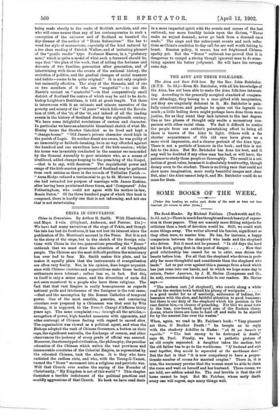CHINA IN CONVULSION.
China in Convulsion. By Arthur H. Smith. With Illustration, and Maps. 2 vols. (Oliphant, Anderson, and Ferrier. 215.)— We have had many narratives of the siege of Pekin, and though the tale has lost its freshness, it has not lost its interest since the publication of Dr. Morrison's account in the Times. But it is not to the story of the siege, but to the sketch of the foreign rela- tions with China in the two generations preceding the " Boxer" outbreak that we must draw the attention of all thoughtful people. The Chinese are the most difficult problem the missionary has ever had to face. Mr. Smith makes this plain, and he makes it equally plain that the instruments of evangelisation are often very faulty. Nor, in his opinion, does longer acquaint- ance with Chinese customs and superstitions make these tactless enthusiasts more tolerant ; rather less so, in fact. But this in itself is only a minor cause, and the diversities of sects did not seem unnatural to a people who have three religions. The fact that that vast Empire is really homogeneous as regards national pride and intolerance of the foreigner is the real cause, —that and the assumption by the Roman Catholics of temporal power. One of the most sensible, genuine, and convincing circulars ever prepared by a Chinaman was that sent by Wen Hsiang, it is supposed, to the French Charge d'Affaires thirty sears ago. The same complaint nth.: through all the articles,— arrogation of power, high-handed measures with opponents, and utter contempt of Chinese feeling with regard to sacred sites. The organisation was viewed as a political agent, and when the Bishops adopted the rank of Chinese Governors, a button on their caps, the significant umbrella, the discharge of cannon, and other observances the jealousy of every grade of official was assured. Moreover, the stereotyped civilisation, the philosophy, the peculiar education of the Chinese which unites the vast provinces and innumerable countries of the Celestial Empire, as represented by the educated Chinese, took the alarm. It is they who have initiated the endless riots, and who, with the Tsang-li-Yarnen, turned the " Boxer" movement into a religious and patriotic war. Will that Church ever realise the saying of the Founder of Christianity, " My Kingdom is not of this world " ? This chapter furnishes a terrible indictment of the political practices and worldly aggressions of that Church. No book we have read deals
in a more impartial spirit with the events and causes of the last outbreak, nor more forcibly insists upon the dictum, "Never make an unjust demand; never go back from a demand once made." The siege and the subsequent events and such reflex tions as China's condition to-day call for are well worth taking to heart. Russian policy, it seems, has not frightened Chinese apathy yet. But the " Boxer " outbreak has proved that it is dangerous to compel a strong though ignorant man to do some. thing against his better judgment. He will have his revenge some day.










































 Previous page
Previous page